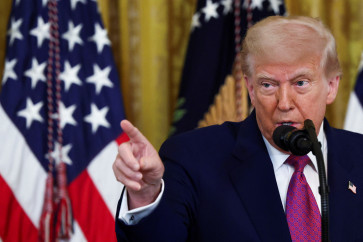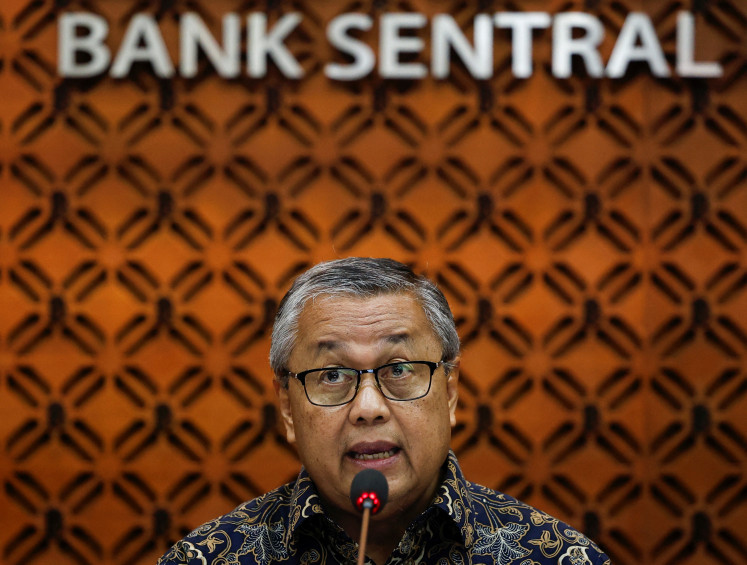Popular Reads
Top Results
Can't find what you're looking for?
View all search resultsPopular Reads
Top Results
Can't find what you're looking for?
View all search resultsBI Forex reserves rise as funds return
Bank Indonesia (BI), the central bank, saw its foreign exchange (forex) reserves rise significantly last month as the extension of US quantitative easing pumped fund inflows back to emerging economies, helping to support the rupiah
Change text size
Gift Premium Articles
to Anyone
B
ank Indonesia (BI), the central bank, saw its foreign exchange (forex) reserves rise significantly last month as the extension of US quantitative easing pumped fund inflows back to emerging economies, helping to support the rupiah.
BI announced on Monday that its forex reserves topped US$95.7 billion by the end of September, or $2.7 billion higher compared to a month earlier. The sum was equivalent to 5.2 months of imports and government external debt repayments.
The increase in forex reserves largely reflected BI's measures to strengthen its policy mix to maintain the rupiah's stability, in addition to policy coordination with the government to curb the current account deficit, BI spokesperson Difi Johansyah said in a statement.
He noted that the accumulation in reserves was also supported by the issuance of sukuk (Islamic bonds) in September, with Indonesia selling $1.5 billion of the debt papers during the month. 'Confidence in the domestic foreign exchange market is getting stronger, with more active and balanced foreign exchange supply and demand shaping rupiah movements,' Difi stated.
The $2.7 billion rise in BI's forex reserves in September was the highest monthly increase this year, giving a vital boost to the central bank, whose dollar reserves were among the fastest-depleting in Asia as the bank was forced to intervene heavily in the market to support the under-pressure rupiah.
The rupiah is now Asia's worst-performing currency, having declined by more than 16 percent since the beginning of this year, mainly because of the wide shortfall in dollar supply due to Indonesia's high current account deficit.
Economists say that stronger forex reserves will spark bullish sentiment in the market and strengthen the rupiah, which was up 24 basis points to trade at 11,432 per dollar on Monday, according to the Jakarta Interbank Spot Dollar Rate (JISDOR). 'The increase in forex reserves is more proof that Indonesia's economy has seen a fundamental improvement,' Standard Chartered economist Eric Sugandi said on Monday in a phone interview.
'We've already seen inflation decline and the trade balance swing into surplus ' all these factors should lead to positive sentiment in the market.'
Philip McNicholas, an economist with BNP Paribas in Hong Kong, said that the increase in BI's forex reserves was not surprising because the US Federal Reserve had decided in September to postpone its plan to taper its monetary stimulus, consequently reversing capital flows back into emerging markets. 'The fact remains that the draw-down in reserves between April has weakened BI's capacity to curb Indonesia's rupiah weakness through intervention,' he said. 'In the current context, it will likely take some time for BI to replenish its reserves.'
While the increase in forex reserves might provide relief for policymakers, however, the sustained decline this year remained 'credit negative' for Indonesia's sovereign debt papers, according to Christian de Guzman, a senior analyst with Moody's Investors Service.
'Around $20 billion year-to-date depletion; you've seen the reserves coverage ratio fall quite substantially,' de Guzman told The Jakarta Post in an interview in Bali.
'But, while the reserves have gone down and the ratio has depreciated, they are not at alarming levels yet.'
' Satria Sambijantoro










